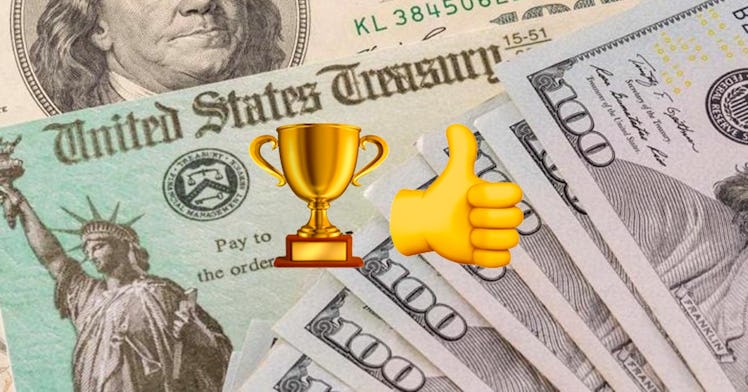The Last Two Stimulus Checks Cut Financial Instability Nearly By Half, Study Says
Turns out giving people money is a great way to improve their lives quickly. and dramatically.

A new paper shows that the pandemic stimulus payments and expanded unemployment benefits decreased material hardship and improved mental health among those who received them.
This shouldn’t come as a surprise—how could free money during an economic crisis not help people survive? But in a country that’s historically been averse to the government helping people too much, it’s important to recognize that what amounted to a massive experiment in direct payments was a rousing success.
This conclusion comes from a University of Michigan analysis of the Household Pulse Survey, a Census Bureau Survey that offers a real-time look at how U.S. households are experiencing the COVID-19 pandemic.
Between December 2020 and April 2021, food insufficiency fell by over 40 percent, financial instability 45 percent, and reported adverse mental health symptoms like anxiety and depression by 20 percent.
Declines in material hardship were greatest among, but not exclusive to, low-income households. Generally, the COVID-19 relief bill passed last December reversed trends of increases to all of these factors, and the American Rescue Plan Act, passed in March of 2021, hastened their decline.
The paper identifies three reasons that the “robust, federal, cash-based” response to the pandemic was so effective. First, it was fast, as providing households directly with cash eased material hardship immediately as soon as payments started hitting bank accounts.
Second, that the response was broad-based (i.e. not targeted only to the lowest-income households) meant that hardship lessened for a wider swath of people. It also meant receiving aid didn’t come with much of the stigma that many welfare programs carry. Stimulus checks remain a very popular policy to this day.
Third, the fact that the resource transferred was cash meant that American families could use it to meet their immediate needs however they saw fit. It’s easy to imagine how less flexible resources (e.g. tax rebates or housing vouchers) would have made the payments less effective.
And while there hopefully won’t be the kind of mass economic devastation wrought by COVID-19 again, the authors of the study do suggest that the success of the payments “is worth learning from, and building off of, in the months and years ahead.”
Hopefully, the President takes this good news to heart and uses it to pass a 4th round of stimulus checks, which would lift nearly 7 million people out of poverty.